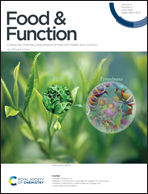Pediococcus pentosaceus B49 from human colostrum ameliorates constipation in mice†
Abstract
Constipation is a prevalent and burdensome gastrointestinal (GI) disorder that seriously affects the quality of human life. This study evaluated the effects of the P. pentosaceus B49 (from human colostrum) on loperamide (Lop)-induced constipation in mice. Mice were given P. pentosaceus B49 (5 × 109 CFU or 5 × 1010 CFU) by gavage daily for 14 days. The result shows that P. pentosaceus B49 treatment relieved constipation in mice by shortening the defecation time, increasing the GI transit rate and stool production. Compared with the constipation control group, the P. pentosaceus B49-treated groups showed decreased serum levels of inhibitory neurotransmitters (vasoactive intestinal peptide and nitric oxide), increased serum levels of excitatory neurotransmitters (acetylcholinesterase, motilin, and gastrin), and elevated cecal concentration of short chain fatty acids (SCFAs). Analysis of cecal microbiota reveals that P. pentosaceus B49 was colonized in the intestine of constipated mice, and altered the cecal microbiota by increasing beneficial SCFAs-producing bacteria (i.e., Lactobacillus, Ruminococcaceae_UCG-014, and Bacteroidales_S24-7) and decreasing potential pathogenic bacteria (i.e., Staphylococcus and Helicobacter). Moreover, transcriptome analysis of the colon tissue shows that P. pentosaceus B49 partly normalized the expression of genes related to GI peristalsis (i.e., Ache, Chrm2, Slc18a3, Grp, and Vip), water and electrolyte absorption and transport (i.e., Aqp4, Aqp8, and Atp12a), while down-regulating the expression of pro-inflammatory and pro-oncogenic genes (i.e., Lbp, Lgals2, Bcl2, Bcl2l15, Gsdmc2, and Olfm4) in constipated mice. Our findings indicate that P. pentosaceus B49 effectively relieves constipation in mice and is a promising candidate for treating constipation.



 Please wait while we load your content...
Please wait while we load your content...